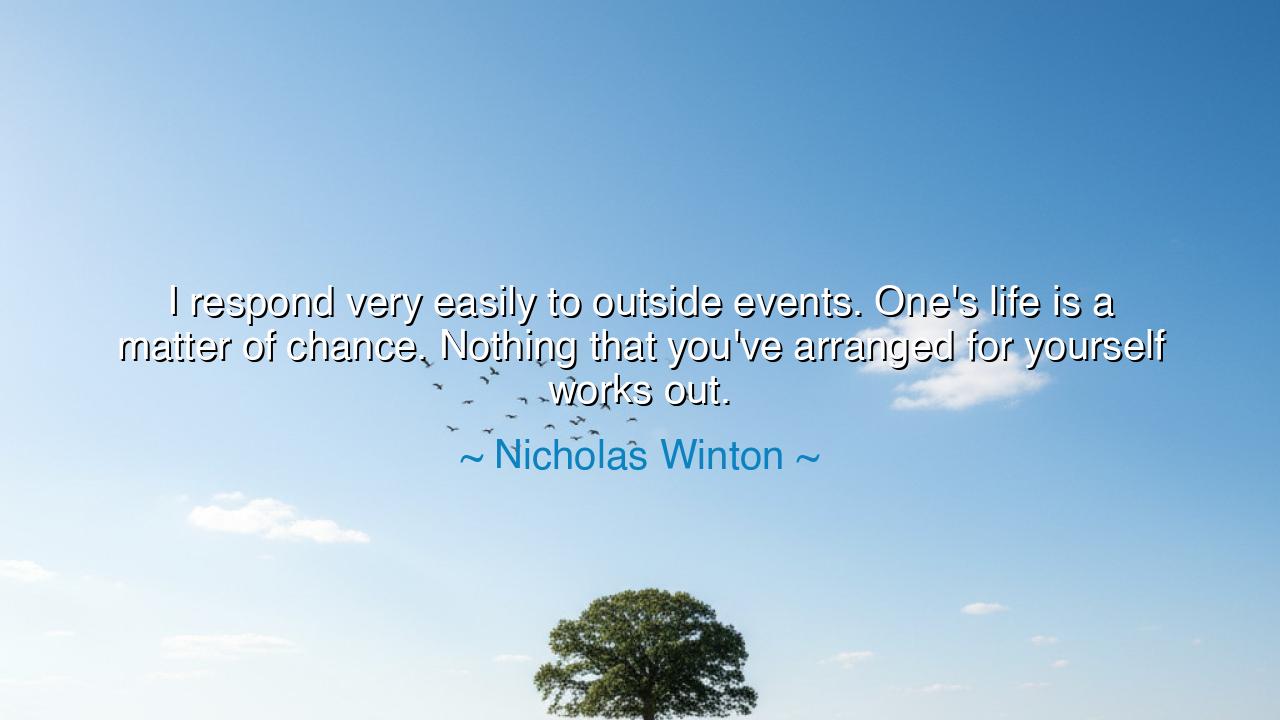
I respond very easily to outside events. One's life is a matter
I respond very easily to outside events. One's life is a matter of chance. Nothing that you've arranged for yourself works out.






In the grand, unpredictable journey of life, there exists a powerful truth that resonates across time and culture — that we are often shaped by events beyond our control. Nicholas Winton's words, "I respond very easily to outside events. One's life is a matter of chance. Nothing that you've arranged for yourself works out," capture this profound reality: that despite our best efforts to plan and organize our lives, the true course of our existence is often determined by forces far greater than our own will. Winton, a man who famously saved hundreds of children from the horrors of war, acknowledges the role of chance and the unpredictability of life in shaping the most meaningful events.
The ancient philosophers understood well the unpredictable nature of life and the essential role of fate and chance in determining human destiny. Heraclitus, the Greek philosopher, famously said that "you cannot step into the same river twice," suggesting that life is in constant flux and that nothing is ever permanent. His philosophy emphasized that change is the only constant, and that to live well, one must embrace the impermanence and uncertainty of life. Winton’s perspective aligns with this ancient wisdom: despite our plans, we are often at the mercy of external forces, and the true test of character lies in how we respond to the unforeseen.
Similarly, Socrates understood that much of life is not under our control, and he famously devoted his life to the pursuit of wisdom, recognizing that what we cannot control must be approached with humility and grace. Socrates’ humility is exemplified in his belief that knowledge of what we do not know is itself a form of wisdom. In this, he accepted the role of chance and unpredictability in shaping the human experience, understanding that the course of our lives is often marked not by predictable outcomes, but by moments of revelation and unexpected turns.
The life of Winton himself provides a powerful modern example of the idea that life is not entirely in our hands. As a young man, he set out to help a small number of children escape Nazi-occupied Czechoslovakia, driven by a sense of compassion and a desire to do something meaningful. His efforts, initially modest and unplanned, were a response to the tragic events unfolding around him. Through his courage and quick thinking, Winton saved 669 children from the Holocaust, an act of heroism that grew largely out of the chaotic circumstances of war. In this way, Winton’s life, though filled with noble intentions, was shaped by chance and opportunity, just as the philosophers of old had suggested.
Indeed, life’s true meaning often emerges from the unexpected. The ancient stories of Odysseus and his long journey home show us that even the greatest heroes must face obstacles far beyond their control, and it is their ability to adapt to the whims of fate that defines their legacy. Odysseus, the cunning and resilient king, could not control the storms that delayed his return, but he responded with resourcefulness and resolve. Similarly, in Winton’s story, it was not a grand plan that led to his success, but a series of chance encounters and moments where he acted quickly and decisively. His willingness to respond to the external events unfolding around him became the turning point that ultimately saved so many lives.
The lesson in Winton’s words is clear: life is not a linear path we chart for ourselves, but rather a journey marked by unexpected events, some of which we can steer, and others that are simply beyond our grasp. The key to navigating such a world lies in our ability to respond wisely and compassionately to what we cannot control. In our own lives, we must learn to adapt to the winds of fate, to remain grounded when things do not go as planned, and to recognize that some of our greatest accomplishments come from our willingness to take action when the world presents us with unforeseen opportunities.
In practical terms, this means embracing uncertainty and taking risks when the moment arises, trusting that our response to life’s challenges will often define the course of our lives. Like Winton, we must not sit idly by, waiting for the perfect moment to act, but instead engage with life as it comes, knowing that even in chaos, there are chances to make a meaningful difference. Let us be inspired by Socrates, Heraclitus, and Winton, and approach each day not as a preordained script, but as an open page, ready to be written by the choices we make in the face of life’s unpredictable currents.
Ultimately, the true strength lies not in controlling life’s events, but in how we meet the unexpected, how we respond to the forces of fate with courage, wisdom, and compassion. For as the ancients knew, it is not our ability to predict the future that matters, but our ability to navigate the unknown with grace, humility, and the unshakable belief that in every chance lies the possibility for growth and meaning.






AAdministratorAdministrator
Welcome, honored guests. Please leave a comment, we will respond soon